February 10, 2016
Edited by David Sanders
Specimen Days
1126–William IX, Duke of Aquitaine, poet (b. 1071), dies.
1609 –John Suckling, English Cavalier poet/dramatist/courtier, is born.
1775 –Charles Lamb, critic/poet/essayist, born in London, England, is born.
1890– Boris Pasternak, Moscow, Russian novelist/poet (Doctor Zhivago, Nobel 1958), is born.
1898 –Bertolt Brecht, German poet and playwright (Mother Courage), born in Augsburg, Bavaria (d. 1956), is born.
1902 –Armand Bernier, Belgian poet (Sorcier Triste), is born.
1920 –Alexander Comfort, English poet/writer (Wreath for the Living), is born.
1934 –Fleur Adcock, New Zealand poet, is born.
1975– Nikos Kavvadias, Greek poet and writer (b. 1910), dies.
1995– Kenton Kilmer, poet/translator, dies at 85.

Seeing’s not everything. At this very
moment the middle-aged are kissing
in the backs of taxis, on the way
to airports and stations. Their mouths and tongues
are soft and powerful and as moist as ever.
Their hands are not inside each other’s clothes
(because of the driver) but locked so tightly
together that it hurts: it may leave marks
on their not of course youthful skin, which they won’t
notice. They too may have futures.
— from “Kissing” by Fleur Adcock
“Seeing’s not everything. At this very / moment the middle-aged are kissing / in the backs of taxis”— Fleur Adcock
World Poetry
Saudi Court Spares Poet’s Life but Gives Him 8 Years and 800 Lashes

A court in Saudi Arabia on Tuesday revised the punishment given to a stateless Palestinian poet convicted of apostasy, reducing it from death to eight years in prison, 800 lashes and public repentance, his lawyer said. The poet, Ashraf Fayadh, had been sentenced to beheading because of the apostasy conviction announced in November, based partly on his published poetry.
Chile Court Orders Poet Neruda's Remains Returned

A Chilean court Wednesday ordered poet Pablo Neruda's remains be returned to his tomb, three years after they were exhumed to determine whether the Nobel laureate was assassinated. Neruda died in 1973, just days after General Augusto Pinochet seized power.
A Saudi Arabian court reduced the sentence of Palestinian poet Ashraf Fayadh from death to 8 years in prison and 800 lashes.
Recent Reviews
A Strange and Quiet Fullness
by Robert Archambeau
Shop windows empty except for a dusty mannequin or a boy’s suit long out of style; a seedy magician doing his threadbare act in an unpopular theater; a fat fly in a matchbox clutched by a lunatic. Charles Simić has been the primary purveyor of images such as these in American poetry for close to half a century, importing them from a mysterious region rumored to lie between the former Yugoslavia and the monstrous mountain passes of his private dream kingdom. A specialist in the uncanny, in objects removed from explanatory contexts, in stories gestured at but left untold, Simić describes his orientation as cosmic rather than historical or natural. He distrusts the tribalism inherent in history, with its chains of “begats” and its stockpiles of grievances, and he sees a direct link between the Romantic idealization of nature and a dangerously naive utopianism.
‘The Poetry of Yehuda Amichai,’ Edited by Robert Alter
by Rosie Schaap
I have one selfish quibble with the expansive, magnificent new book “The Poetry of Yehuda Amichai,” edited by Robert Alter. It excludes a personal favorite, “The Eve of Rosh Hashanah.” Every year, on the occasion of its title, I read the poem aloud.
Beauty/Beauty by Rebecca Perry review – curiosity, clumsiness and charm
by Evan Jones

Sasquatches, dinosaurs, buried animals in a pet cemetery: Rebecca Perry’s poems are filled with creatures we can never approach. She focuses on them, dreams of their presences, gives them lives connected to her own. In “Poor Sasquatch”, she writes: “When I walked through a shopping centre, he was behind me, / peering in through the shop windows at the colourful cakes, / which he longed for.” The sasquatch, as we know, is elusive quarry, but here it tracks the poet, a shadow figure or second self. It even acts as a kind of benevolent protector as “when I walked along a pavement / he was on the traffic side, taking the hits”. The beast plays its role to the poet’s Beauty/Beauty.
Knows It Knows Too Much: Jennifer L. Knox, Elliptical Compromises, and the Resolution of Humor
by Ailbhe Darcy
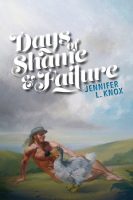
As long ago as 1998, Stephen Burt noticed a tendency for contemporary poets to want to have their cake and eat it too, to speak from the heart while gesticulating comically at the bloodied chest cavity where a heart blatantly isn’t. Such poets, Burt wrote at Boston Review, “try to manifest a person—who speaks the poem and reflects the poet—while using all the verbal gizmos developed over the last few decades to undermine the coherence of speaking selves.” Last year at The Account, Rachel Greenwald Smith resurrected these paradoxical souls—whom Burt had dubbed “Elliptical poets”—to roundly criticize them in an essay entitled “Six Propositions on Compromise Aesthetics.” For Greenwald Smith, it is a sign of bad faith to draw simultaneously from a modernist tradition debunking the self while also employing a lyric tradition that values the individual, personal voice. Such poets, she argues, reinforce late global capitalism by constructing a marketable version of the individual, all feely bells and ironic whistles.
Jennifer L. Knox’s latest collection, Days of Shame and Loathing, pinballs delightedly between a sincerely-felt self, an ironically-meant self, and a horde of other selves altogether, taking on many different personae in the course of the book.
The Tiniest Ark: Jennifer Moore’s The Veronica Maneuver
by Virginia Konchan
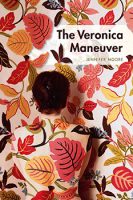
You never enter the same river twice, according to Heraclitus. Likewise, in Jennifer Moore’s debut collection, The Veronica Maneuver, you never enter the same poem twice—or at least, thanks to her vellities and sleight of hand, the world has become defamiliarized, rearranged. As have the metaphors, diction, and incantatory hymns of the poems themselves. One cannot return to the imaginative space of a first reading, a first encounter, the unveiling.
Love, Actually
Robert Lowell adored intelligent women and treated them terribly.
by Michelle Dean
Robert Lowell had been dead seven years when The Paris Review interviewed Elizabeth Hardwick, the novelist, critic, and his second-to-last wife.
Friends of Dead Poets Society
Larry Levis’ latest (and possibly last) posthumous collection
by John Cotter
A writer’s choice in friends may never matter more than when he dies. We could have had Byron’s Memoirs, but his sister and his friends quarreled over the manuscript and it was torn and burned to ashes. Virgil gave instructions for the same to be done to the Aeneid, but Horace (and Augustus) wouldn’t hear of it. Franz Kafka begged Max Brod to incinerate The Trial and The Castle, but Brod’s better angels prevailed. Fred Kaplan recently announced in a letter to the Times Literary Supplement that he’s in possession of “four substantial loose-leaf volumes” of Gore Vidal’s witty and delightful letters but that he won’t be publishing them or turning them over to anyone else while he’s alive, as “a small bit of revenge” against the dead man.
New Books
by Christine Smallwood
What have you done with your life since 1995? Kevin Young has published two thousand pages of poetry, plus a book of criticism. BLUE LAWS: SELECTED & UNCOLLECTED POEMS, 1995–2015 (Knopf, $30) gives a sense of his range and evolution. Its epigraph comes from Lightnin’ Hopkins: “Playing the blues in the old days was like being black twice.” Read as a whole, the book tells a story about how history has been written on African-American bodies, and imagines the voices that have spoken back.
Sasquatches, dinosaurs, buried animals in a pet cemetery: Rebecca Perry’s poems are filled with creatures we can never approach.
Broadsides
Luxe et Veritas
Frederick Seidel’s poems of age and experience.
by Dan Chiasson
If the id had an id, and it wrote poetry, the results might sound like “Widening Income Inequality” (Farrar, Straus & Giroux), Frederick Seidel’s sixteenth collection. The title borrows a current meme, while also suggesting Yeats’s apocalyptic poem “The Second Coming” (“Turning and turning in the widening gyre / The falcon cannot hear the falconer”). Seidel’s satanic refinement is expressed in poems at once suave and vengeful, their garish pleasures linked to the many splendid goods—Ducati motorcycles, bespoke suits, Italian shoes—that they describe
Portrait of a Press: The University of Akron Series in Poetry
by Philip Metres
When I began this essay, in July 2015, at least according to news reports, the University of Akron Press (UAP) had ceased to exist — all its employees fired by Scott Scarborough, a new president eager to make his name balancing a bloated budget. It was part of a mass layoff that included nearly 200 workers at the university, which had fallen on hard times.
“Widening Income Inequality” is Frederick Seidel’s sixteenth collection.
Drafts & Fragments
Rule of Three: A Brief Guide to the Anchored Terset
by Richard Lea
It’s not often that I’m moved to verse, but it’s also not often that I hear of a
New
Poetic
Form
.
Hooray for the Anchored Terset [sic]; forged by Lisa Matthews among the sparks of creation coming off Northumberland’s Northern Poetry Library in honour of National Libraries Day on 6 February. The Anchored Terset strips poetry down to the bones, consisting of four lines, three words and just one piece of punctuation.
The Anchored Terset strips poetry down to the bones, consisting of four lines, three words and just one piece of punctuation.
Poetry In the News
Remembering Beloved Chicano Poet, Author

The Chicano poet Francisco Xavier Alarcón died on Jan. 15, 2016— four days after a celebration of his life and work was held at Café La Boheme in San Francisco’s Mission District. On that day an overflow crowd of family and friends were present to hear Francisco read his work in public for the last time. Francisco rose to prominence as an outstanding poet in the early 1980s, when he won the first Ruben Darío Poetry Prize awarded by Casa Nicaragua. He was also a Fulbright Fellow in Mexico, and published his first major collection of poetry “Snake Poems.”
What Frank O’Hara Poems Reveal about Post-internet Brains
As if 2016 hadn’t already provided enough of a reminder that even sexually ambiguous geniuses are only mortal in the end, this year marks the 50th anniversary of the death of Frank O’Hara. During his lifetime the New York poet was more famous for his curatorial work at MoMA than his writing, but in the half-century that’s passed since he was run over by a jeep on Fire Island, his work has become shorthand for many 21st century concerns.
The Chicano poet Francisco Xavier Alarcón died on Jan. 15, 2016.
New Books
The Nomenclature of Small Things by Lynn Pedersen
[Paperback] Carnegie Mellon, 80 pp., $15.95
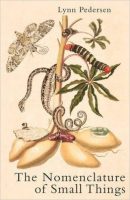
The Nomenclature of Small Things explores grief through the language of science, history, and art. From Charles Darwin to Carl Linnaeus, from the passenger pigeon to fossil ammonites, each poem seeks to name, to enumerate, to order—to claim a particular place for the human creature in a catalog of extinction and loss.
Blue Laws: Selected and Uncollected Poems, 1995-2015 by Kevin Young
[Hardcover] Knopf, 608 pp., $30.00
A rich and lively gathering of highlights from the first twenty years of an extraordinary career, interspersed with “B sides” and “bonus tracks” from this prolific and widely acclaimed poet.
Blue Laws gathers poems written over the past two decades, drawing from all nine of Kevin Young’s previously published books of poetry and including a number of uncollected, often unpublished, poems.
Rival Gardens: New and Selected Poems by Connie Wanek
[Paperback] University of Nebraska Press, 204 pp., $19.95
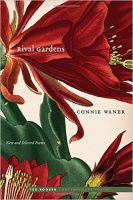
For decades a restorer of old homes, Connie Wanek shows us that poetry is everywhere, encountered as easily in the waterways, landscapes, and winters of Minnesota, as in the old roofs and darkened drawers of a home long uninhabited. Rival Gardens includes more than thirty unpublished poems, along with poems selected from three previous books—all in Wanek’s unmistakable voice: plainspoken and elegant, unassuming and wise, observant and original.
Window Left Open: Poems by Jennifer Grotz
[Paperback] Graywolf Press, 72 pp.,$16.00
In this lush, intricately crafted collection, Jennifer Grotz explores how we can become strange to ourselves through escape, isolation, desire–and by leaving the window open. These poems are full of the sensory pleasures of the natural world and a slowed-down concept of time as Grotz records the wonders of travel, a sojourn at a French monastery, and the translation of thoughts into words, words into another language, language into this remarkable poetry. Window Left Open is a beautiful and resounding book, one that traces simultaneously the intimacy and the vastness of the world.
The Spokes of Venus by Rebecca Morgan Frank
[Paperback] Carnegie Mellon, 64 pp., $15.95
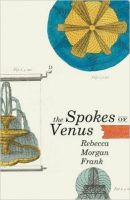
Magicians, wig makers, sculptors, perfumers, choreographers, and composers all help conjure the worlds of Frank's second collection, The Spokes of Venus. These poems offer a landscape shaped by the tensions between the act of making and the art of observing. If music and art are the sisters of poetry, this collection is a chorus-a glorious one-of siblings arguing and singing.
The Nomenclature of Small Things by Lynn Pedersen explores grief through the language of science, history, and art.
Correspondences
Emilia Phillips
by Lightbox

Emilia Phillips is the author of two poetry collections from the University of Akron Press, Signaletics (2013) and Groundspeed (2016), and three chapbooks, most recently Beneath the Ice Fish Like Souls Look Alike (Bull City Press, 2015). She’s received fellowships from the Bread Loaf Writers’ Conference, the Kenyon Review Writers’ Workshop, U.S. Poets in Mexico, and Vermont Studio Center. Her poetry and lyric essays appear in Agni, Harvard Review, The Kenyon Review, New England Review, Ninth Letter, Ploughshares, Poetry, and elsewhere. She is the Assistant Professor of Creative Writing at Centenary College of New Jersey.
An Interview With Rita Dove
by Claire Schwartz
“Shape the lips to an o, say a. / That’s island”: So begins the last poem in Rita Dove’s debut collection, The Yellow House on the Corner (1980). The poem starts with the architecture of the body—the mouth piecing together familiar shapes to make way in foreign terrain—and opens onto a meditation about the potential of precise language to reroute unfolding history. At once grounded in the body and extending across space and time, the exacting and ambitious “Ö”—and the collection that contains it—heralded a new voice in American literature.
Emilia Phillips is the author of two poetry collections from the University of Akron Press, Signaletics (2013) and Groundspeed (2016).
Envoi: Editor’s Notes
Today, as I write this, it's the birthday of Elizabeth Bishop. When I think of the poems of hers of which I am the fondest, I come back to "The Filling Station." Near the end of the poem, she describes the rows of oil cans, neatly lined up in the gas station. When I used to teach this poem, I would draw a picture of the cans on the board. The students, of course, didn't know that Esso was the precursor to Exxon. And so, as the poem explains, the cans, which had ESSO written across them, when lined up neatly would read Esso-so-so-so. What I myself didn't realize until much later, after having read someone else's explication of the poem, was that "so-so-so" was a soothing sound that used to be made (perhaps still is) to calm nervous horses, which leads neatly to the "high-strung automobiles" of the penultimate line.
 Filling Station
Filling Station
by Elizabeth Bishop
Oh, but it is dirty!
—this little filling station,
oil-soaked, oil-permeated
to a disturbing, over-all
black translucency.
Be careful with that match!
Father wears a dirty,
oil-soaked monkey suit
that cuts him under the arms,
and several quick and saucy
and greasy sons assist him
(it’s a family filling station),
all quite thoroughly dirty.
Do they live in the station?
It has a cement porch
behind the pumps, and on it
a set of crushed and grease-
impregnated wickerwork;
on the wicker sofa
a dirty dog, quite comfy.
Some comic books provide
the only note of color—
of certain color. They lie
upon a big dim doily
draping a taboret
(part of the set), beside
a big hirsute begonia.
Why the extraneous plant?
Why the taboret?
Why, oh why, the doily?
(Embroidered in daisy stitch
with marguerites, I think,
and heavy with gray crochet.)
Somebody embroidered the doily.
Somebody waters the plant,
or oils it, maybe. Somebody
arranges the rows of cans
so that they softly say:
esso—so—so—so
to high-strung automobiles.
Somebody loves us all.